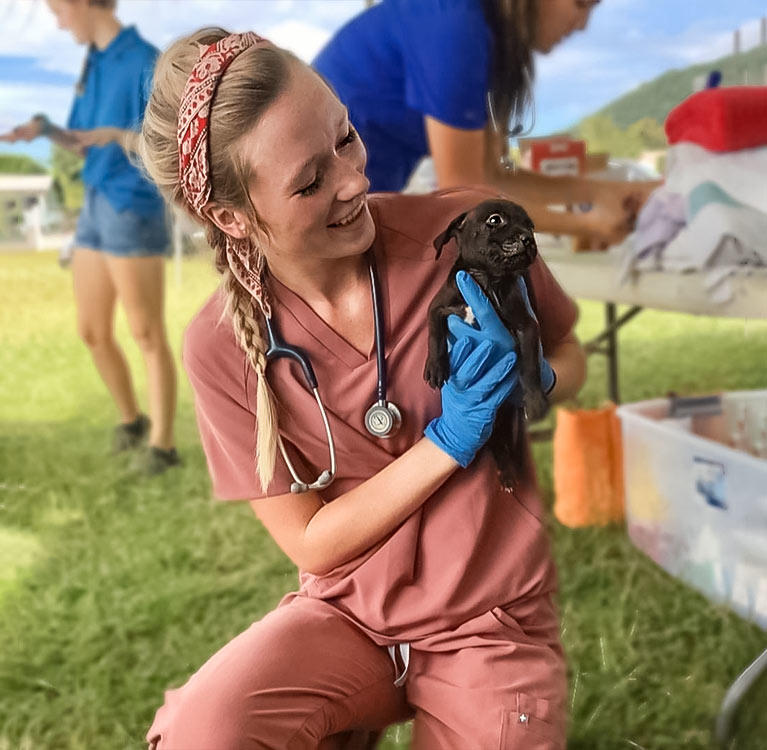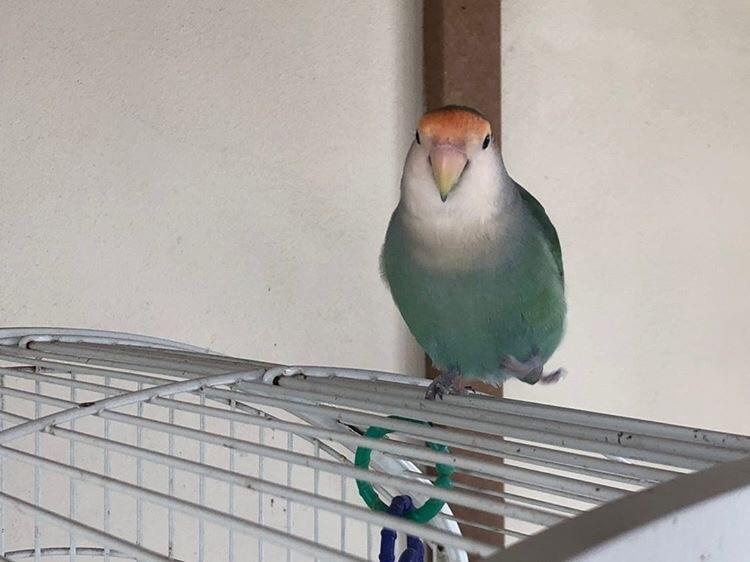Veterinary medicine is a rewarding but competitive field. Gaining admission to an accredited veterinary program such as Ross University School of Veterinary Medicine (Ross Vet)* requires careful planning and hard work. Before applying to vet school, check out our vet school application tips below to better understand what you can do to strengthen your chance for vet school admission.
STRATEGY FOR CREATING A STRONG VET SCHOOL APPLICATION
Your vet school application has several parts. You can learn more about the requirements for admission in a previous post in our Ross Vet blog series. Here, we will focus more on preparation and strategy.
PREPARING FOR THE JOURNEY
Applying to vet school has many moving parts and can take time. It’s better to start your vet school application early—in fact, your preparation may have already begun. Perhaps you have completed some prerequisites and built relationships with professors or veterinarians—some of whom may write letters of recommendation for you.
Even if you haven’t yet taken the above steps, you likely have a passion for veterinary medicine and started to gain relevant experiences. Your values, desire to serve, and curiosity are important parts of who you will become as a veterinarian down the road. Make sure to highlight your virtues and interests in your vet school application.
Good university grades are important for your vet school application. And while many schools such as Ross Vet have removed the Graduate Record Examination® (GRE®) requirement, it’s best to double check the admissions requirements before submitting your application. Whether you have to submit your GPA, your GRE® scores, or both, know that they are only part of the overall portrait admissions reviewers want to see. Applicants can show their potential for success in vet school by writing excellent personal statements or acing interviews.
Admissions reviewers do not expect perfection. They want to see determination, resilience, growth, and triumph over adversity. Applicants can explain how they have evolved as students over the course of their studies, and how that evolution translates into a commitment to veterinary medicine.
EXPERIENCE WITH ANIMALS
Experience with animals is a major part of your vet school application. For admission into Ross Vet, you need at least 150 hours under the supervision of a Doctor of Veterinary Medicine (DVM). According to the American Association of Veterinary Medical Colleges (AAVMC), most applicants earn around 1,860 hours of veterinary experience and 270 hours of research experience before applying to vet school.
While hands-on experience is important, vet school admissions teams prefer well-rounded experiences to demonstrate various abilities and interests. You should try to gain experience working with small animals, large animals, and exotic animals or “pocket pets.” You should also try to gain experience in multiple veterinary specialties to better understand your overall career goals.
Admissions teams understand you may not have easy access to a wide range of opportunities. However, many veterinarians are eager to provide experience to prospective vet students. It may help to start with shadowing practicing vets and their assistants. Observing a veterinarian work can be a good learning experience which may open doors to other opportunities.
If you’re unsure where to begin, speak with your undergraduate advisor to explore potential opportunities. You can also speak with vets in your area about shadowing and internship opportunities. You could also work part time at a local veterinary hospital or clinic to gain experience working under a licensed veterinarian.
Another way to gain experience is to attend pre-veterinary symposiums hosted by the American Pre-Veterinary Medical Association (APVMA). The APVMA provides resources for high school students and pre-vet majors, scholarship opportunities, and a list of universities with local chapters. Pre-vet students can gain experience by working as a research assistant for a licensed veterinarian. These vets may be instructors at your college or university. This is a great way to diversify your experience and build new skills.
SET YOURSELF APART
Your vet school application should list work experience, clubs, organizations, and leadership opportunities. View your experience as ways to demonstrate your virtues. Some virtues can include accountability, maturity, responsibility, and dedication to service.
As a vet school applicant, you may think non-animal related experience is irrelevant—it’s not. Vet school admissions teams want to learn about you as an individual. Your long-term interests in sports, music, science, and the arts should be included in your vet school application. Outside interests add depth to a vet school application by showing the person behind the transcript.
One of our top vet school application tips is to seize opportunities to conduct research, even if it is not in the veterinary field. Conducting research demonstrates critical thinking skills, your desire to learn, and your inquisitive mind. Research experience could help you stand out from the crowd.
LETTERS OF RECOMMENDATION
If you want a recommendation letter to stand out, request one from someone you've known for a while. This adds weight to their words as these recommendations are from someone who has worked with you for an extended period. If you have only known a vet for a few weeks, they may not be able to write a strong letter for you.
Think carefully about recommendation prospects and approach these professors or veterinarians early. Remember, professors are likely writing multiple recommendation letters at once. Give them enough time to write a solid letter on your behalf.
PERSONAL STATEMENT
The essay or personal statement part of your vet school application is more important than you might expect. It lets you tell your story, share your values and goals, and provide a theme to your application. Think about likely questions an admissions reviewer might ask and consider them while creating your personal statement.
At Ross Vet, a personal essay is required as part of your application. We want you to describe how a defining moment in your life steered you toward a career in veterinary medicine. Consider using that moment as the focal point of your essay.
Ross Vet accepts the personal statement submitted through the Veterinary Medical College Application Service (VMCAS) as your essay. You may also submit your essay directly to Ross Vet’s online application.
Although there is no set of rules mandating what a strong personal statement should include, here are a few basics to help you successfully craft an effective personal statement:
- Discuss how you would contribute to the profession and patient care, all of which will help you stand out from other applicants.
- Explain why you are good candidate for veterinary school—in a pile of 100 applications, would you enjoy reading your statement?
- Convey your passion for veterinary medicine in your statement.
- Avoid repeating information from your transcripts or reference letters.
- Ask yourself if this essay is a good representation of your character, ideals, and aspirations.
3 QUESTIONS ABOUT APPLYING TO VET SCHOOL
Vet school applications have several moving parts, each with their own deadline. As such, it’s common for you to wonder:
When Should I Apply to Vet School?
If you plan to start vet school immediately after undergraduate school, start your application around fall of junior year. This gives you time to build your application, gain experience, and build relationships for those ever-important letters of recommendation. It also gives you time to finalize and submit your application prior to the deadline.
If you plan on taking a gap year between undergraduate school and vet school, apply the year before you want to start. The VMCAS standard application opens in January and closes mid-September. During the standard application phase, you can upload personal statements, recommendation letters, and transcripts.
While most vet schools don’t start accepting applications until May, Ross Vet has three start dates in January, May, and September, allowing you to choose when you want to begin.
How Competitive is Vet School?
There are 35 accredited veterinary schools across the US and Caribbean. This makes them notoriously competitive, but this doesn’t mean getting into one is impossible. To increase your chances of acceptance, focus on gaining experience to create a strong application. Whiles grades and scores are important, vet school admissions teams also want to learn about you as an individual.
Pursue opportunities aligned with your values to give vet school admissions teams a better idea of who you will be as a veterinarian. These opportunities may include conducting research, shadowing local veterinarians, taking leadership positions, and more. Remember, although veterinarians work with animals, they are also team leads.
How Many Vet Schools Should I Apply to?
This number ultimately depends on your timeline and budget. Vet school applications often come with associated fees you may be responsible for paying. Applicants applying through the VMCAS may qualify for a fee waiver, however only a limited number of waivers are available.
Each vet school has their own application timeline and requirements. You’re responsible for completing and submitting any supplemental applications or essays each school requires.
ADVICE FOR WHEN YOU ARE APPLYING TO VET SCHOOL
Succeeding in vet school requires perseverance and drive. Be sure to feature your personal values, your dedication, and the contributions you hope to make to veterinary medicine and the larger world. Let your experiences, volunteer work, and relationships showcase your dedication, values, and drive.
Vet schools value communication and interpersonal skills as much as animal-related experiences. Although vets care for animals, they work closely with people. This is another place where you can show the breadth of your experience and add personality to your vet school application.
You should write your statement long before you are ready to submit your application. Be sure to have a third party read your statement and provide constructive criticism. Find a grammar expert to proofread it for you. Remember, your vet school application should show strong communication skills. You don’t want mistakes to slip into your final draft.
INTERESTED IN ROSS VET?
Now that you know how to apply to vet school, take a closer look at Ross Vet’s DVM program, where the broad-based curriculum integrates unique research opportunities, classroom study, and hands-on clinical training.
If you have the necessary animal experience and have followed some of these tips, perhaps you are ready to apply for admission at Ross Vet.
*Ross University School of Veterinary Medicine confers a Doctor of Veterinary Medicine (DVM) degree, which is accredited by the American Veterinary Medical Association Council on Education (AVMA COE), 1931 N. Meacham Road, Suite 100, Schaumburg, IL 60173, Tel: 800.248.2862. For more information please visit: https://www.avma.org/education/accreditation-veterinary-colleges.
The AVMA COE uses defined standards to evaluate veterinary medical education programs, including facilities, clinical resources, curriculum, faculty, student outcomes and research programs. The standards are interpreted and applied by the AVMA COE-accredited veterinary medical education programs in relation to its mission.







